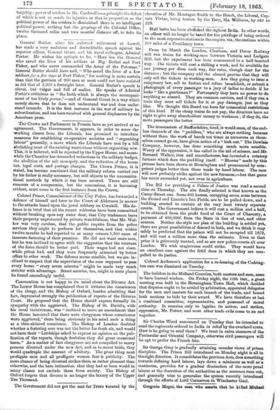General Butler, since his enforced retirement at Lowell, has made
a very malicious and discreditable speech against his superior officer, General Grant. and his naval colleague, Admiral Porter. He wishes his epitaph to be, " Here lies the General who saved the lives of his soldiers at Big Bethel and Fort Fisher, and who never commanded the Army of the Potomac." General Butler should have said, " Who saved the lives of a few soldiers for a few days at Fort Fisher," for nothing is more certain than that the garrison of 900 men at most could not have resisted as did that of 2,300 a fortnight later. General Butler's speech is clever, but vulgar and full of malice. He speaks of Admiral Porter's criticisms as " the froth which is always the accompani- ment of too lively porter,"—and of General Grant in a way which merely shows that he does not understand war and does under- stand inuendo. It is the first instance in the war of military in- subordination, and has been received with general displeasure by the American prem.






























 Previous page
Previous page